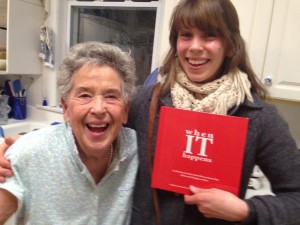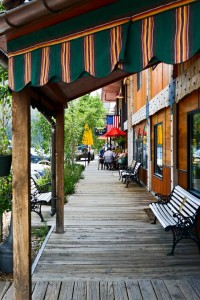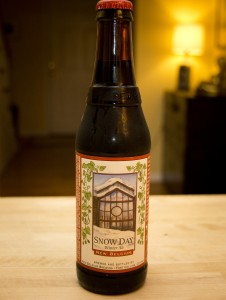
There is no way to be a spiritual person without your body. There is no enlightened height you can reach where having a body is no longer necessary for your life. This is the package we come in: dust and breath, body and spirit.
It’s the package Jesus came in, born with all the human vulnerability and fragility we experience (naked, poor, manger) while still, mysteriously, being God. Fully human, fully divine.
Advent is an invitation to consider your body. As we anticipate the feast of Christmas, God’s incarnation (embodiment) in Jesus Christ, how is God calling our attention to our own embodiment?
I’m talking with college students tonight about de-stressing. Tomorrow’s the last day of classes so you can imagine their stress level. Like the rest of us, they tend to think in terms of “when this is over.” When this semester is over, I will read that novel. When I graduate, I will learn to cook. When I have a real job, I will make time every day to pray. When I land that promotion, then I’ll have enough money. When my kids are older, then I’ll be able to exercise….
The obvious problem with this thinking is there is never a perfect time to do the hard, counter-cultural work of cultivating our lives. It’s far easier to let life happen to us, gathering us in a huge rolling snowball of stress and hurry and other people’s agendas. There is no perfect time, thus, every time is perfect for this life’s work.
The other problem with this thinking is we are always training ourselves. What we practice is how we live. A life spent out of control and waiting for perfection is just that. A life spent choosing – even in very small ways – to get out of the way of that huge snowball, is a life of slow, steady cultivation. Of body and spirit.
Advent has already gotten off to a rocky start for me but I am trying to remember and practice exactly these things. I’m looking forward to the wisdom of my students as we talk together tonight. I know tomorrow will be just as imperfect and lovely as today. So, in this season of waiting, I am not waiting to practice what I preach, even as I wait on the mystery of Christmas.
Here are a few tips I’m sharing with students tonight, ways to help bring body and spirit together more intentionally. Blessings as you cultivate an embodied spirituality.
Practice resting in God for 3 minutes a day. Sit in a comfortable position and breathe deep belly breaths. Try to focus your attention on physical sensations and the sound/feel/movement of your breath. Let that be enough prayer for these three minutes. Do not try to be “holy.” Just be present. Pay attention without judgment. Don’t “say” anything to God; just know it’s enough to sit still in God’s presence without controlling or narrating the encounter. No matter how rushed you are, I guarantee you always have 3 minutes. Choose to use them this way.
Set aside a time each day or each week to be completely offline. Do it for at least an hour or two, but a whole day is wonderful. You don’t have to pray and meditate that whole day/time but as you go about time offline, notice how and where you are. Being connected isn’t “bad” but it can be disorienting (taking you to other places and people than those where and with whom you actually are) and a huge time suck (“just one minute” online turns into an hour) and the frenetic, hyperlinked nature of it contributes to a racing, non-resting mind and spirit. Choose to check out and live a human pace for discreet periods each day or week. It will put things in perspective.
Before you eat a meal, before you even offer a prayer before your meal, take three deep breaths.Notice the feel of the cool air entering your nostrils and the warmer air leaving. Three deep, slow breaths.
Do the same thing right before you open your email in the morning or start the mountain of laundry. Three deep, slow breaths.
Drink water. As much as you can possibly stand.
Sleep. Make this one of the choices you exercise. This is another way of expressing your confidence and trust that God can keep the world spinning without your help for a few hours.
Sleep without your electronic devices on your pillow or nightstand. If your phone is also your alarm clock, set your phone to airplane mode, then set the alarm. Then turn it off and leave it alone until it wakes you up at the appointed time.
Move. If you are too tired or busy to do an actual workout, at least try a few stretches or walk around the block. Get out of your head and into the rest of you for a few minutes.
Eat. Try to make it nourishing food. Try enjoying it instead of wolfing it down. If you know you’ll be busy, take a few minutes to stock up on easy, healthy snacks you can grab in a hurry (rather than ordering late night pizza because you don’t have any groceries).
Prepare. Don’t just get up and start running until you drop – choose what makes your list for today and how you will go about it all. Yes, the choices might not be ideal, but you do still have choices…What really has to get done today? (Exam at 2pm, call Mom on her birthday) What can wait? (Reorganizing my shoe or spice collection, researching best post-graduation trips to Europe) Remember that you need to eat, drink, sleep, and spend at least 3 minutes resting in God today, too. Write down those things and the things that really have to get done today. Then take a look at the list: is it reasonable (can a non-bionic human being actually accomplish these things in the waking hours of a day)? If it is, great – that’s your guide for the day and for saying “no” to other things that try to worm their way into your list. If it is not reasonable, take a second look. Can anything be taken off the list? Is there a way to move anything to another day? If all of those are “no’s” then decide how much time and effort you will give to each of your list items in order to get them done – this will likely mean that you won’t be doing all of them at 100% but that’s OK. Choose for that to be ok for these items on this day.
Remember God loves you exactly as you are, with all of your unfinished business and half-assed efforts. God loves you no matter what happens on the exam or the relative cleanliness of your house or your Christmas shopping list. This hard-to-love, beautiful you who God loves is the one you are also called to love. You cannot “love your neighbor as yourself” if you don’t love yourself. Start now. If you are good enough for God to love, you are good enough. Trust that.
*
photo credit: © 2006 Jonathunder, CC BY-SA 3.0











